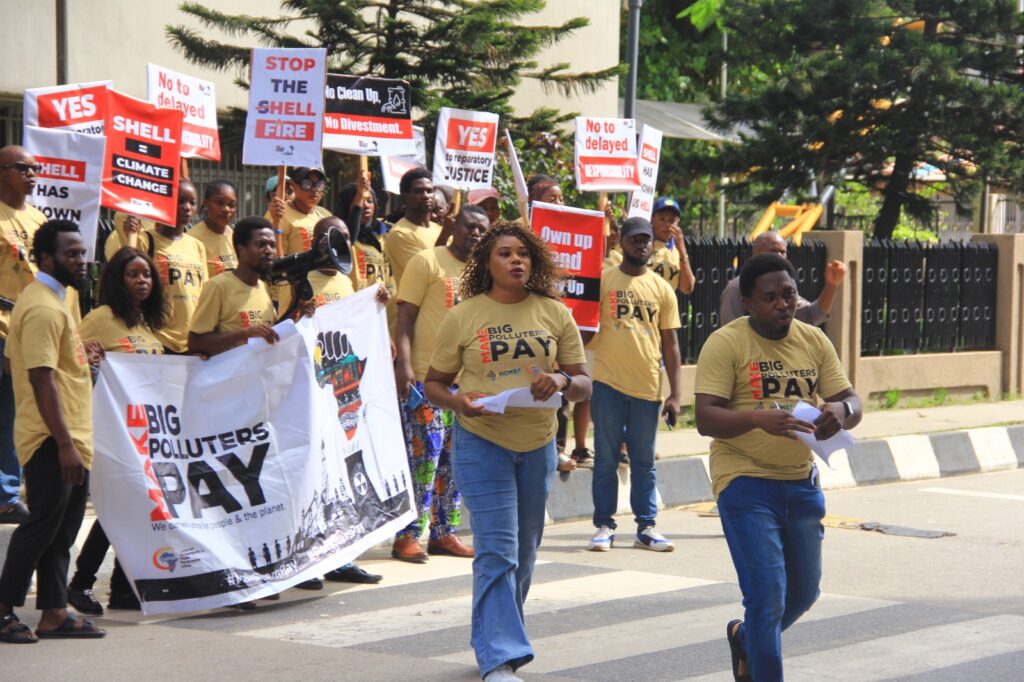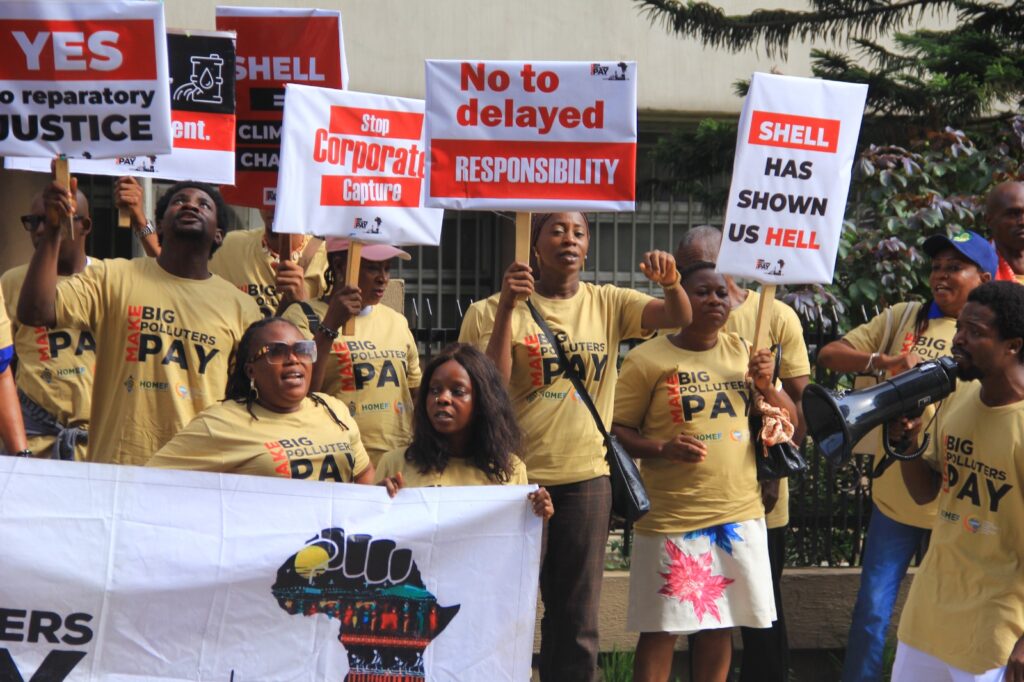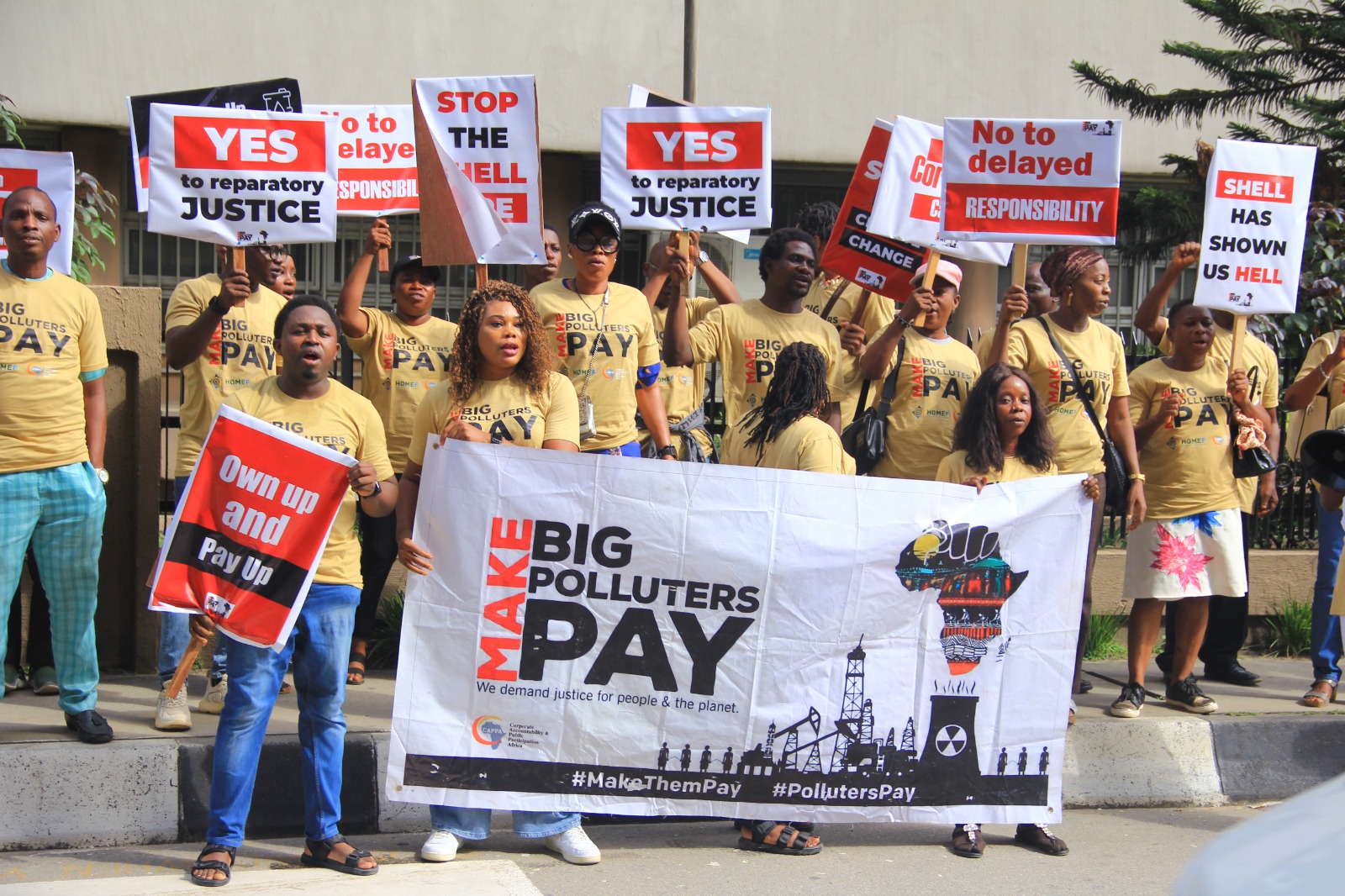By Joke Kujenya
EARLY TUESDAY, a coalition of civil society organizations converged at the Shell Petroleum Development Company (SPDC) headquarters in Lagos to protest the oil giant’s planned departure from Nigeria without addressing the environmental devastation it has caused.
The demonstration was strategically timed to coincide with Shell’s annual general shareholders meeting in London, amplifying the urgency of their demands.
Environmental activists and concerned citizens displayed vivid placards bearing messages such as ‘Stop Shell fire,’ ‘Shell has shown us hell,’ ‘Stop corporate capture,’ and ‘Yes to reparatory justice,’ highlighting their grievances against Shell’s decades-long impact on the Niger Delta region.
Key voices at the protest included Zikora Ibeh, Research Lead at Corporate Accountability and Public Participation Africa (CAPPA), and Ogunlade Olamide Martins, CAPPA’s Programme Officer on Climate Change.
They vehemently criticized Shell’s plan to offload its Nigerian operations to local entities, questioning the capacity of these smaller companies to manage the extensive environmental liabilities left in Shell’s wake.
A joint statement from CAPPA and the Health of Mother Earth Foundation (HOMEF), signed by executive directors Rev. Nnimmo Bassey and Akinbode Oluwafemi, respectively, underscored the deep-seated discontent among affected communities.
The statement castigated Shell’s executives for convening in the luxurious environs of London while the ecological and humanitarian crises in the Niger Delta continue unabated.
“Shell’s shareholders would rather choose the comfort of the intercontinental London Hotel to review their deceitful and environmentally devastating strategies, showing utter disregard for the dignity and well-being of those suffering from their hazardous operations,” the statement read.
The controversy stems from Shell’s intention to divest its onshore business to Renaissance, a consortium of five companies.

Activists argue this maneuver is a calculated attempt to evade accountability for the massive pollution and socio-economic disruption inflicted on the Niger Delta. Shell’s legacy includes contaminated farmlands, polluted water bodies, and communities ravaged by health issues linked to prolonged exposure to toxic substances.
Adding insult to injury, Shell purportedly plans to finance the acquisition through loans to these new operators, further entrenching its influence while offloading environmental responsibilities.
This tactic has been denounced as a shameless exploitation, perpetuating Shell’s profit-driven agenda at the expense of vulnerable Nigerian communities.
The demonstrators called on the Nigerian government to enforce stringent measures to ensure Shell fulfills its obligations before exiting the country.
These demands include:
- Conducting comprehensive environmental and health audits,
- Decommissioning obsolete infrastructures, and
- Compensating affected populations adequately.
Speakers at the protest highlighted the absurdity of Shell’s projected image of environmental stewardship, pointing out that scientific evidence consistently debunks its promises of a clean energy transition.
The protesters insisted that Shell’s so-called commitment to achieving net-zero emissions by 2050 is merely a delaying tactic, designed to obscure its continued environmental offenses.
CAPPA’s Project Manager, Gideon Adeyeni, emphasized the moral imperative for Shell to own up to its legacy of destruction. “A company that has wreaked havoc across a region should not be allowed to leave without being held responsible for fixing the mess it has created,” he declared.
The coalition’s demands are clear:
- An independent environmental assessment of the Niger Delta,
- A thorough health audit of its residents, and
- A comprehensive clean-up and remediation of polluted areas.
They also call for Shell and Chevron to be held accountable for the destruction they have wrought and insist that any divestment or expansion plans follow due process, including proper decommissioning of infrastructure.
As the protest wrapped up, the resounding message was one of justice and accountability.
The civil society groups reiterated that the Nigerian government must prioritize human and environmental dignity over corporate profits, ensuring that multinational corporations like Shell are not allowed to shirk their responsibilities.
To drive home the points, their demands were succinctly encapsulated: “OWN UP and CLEAN UP.”

At JKNewsMedia, our dedication to delivering reliable news and insightful information to our cherished readers remains unwavering. Every day, we strive to provide you with top-notch content that informs and enlightens. By donating to JKNewsMedia, you directly contribute to our mission of delivering quality journalism that empowers and informs. Your support fuels our commitment to bringing you the latest updates and in-depth analysis. Let's continue to uphold the highest standards of journalism and serve our community with integrity and dedication. Thank you for being a part of the JKNewsMedia family and for your ongoing support.





